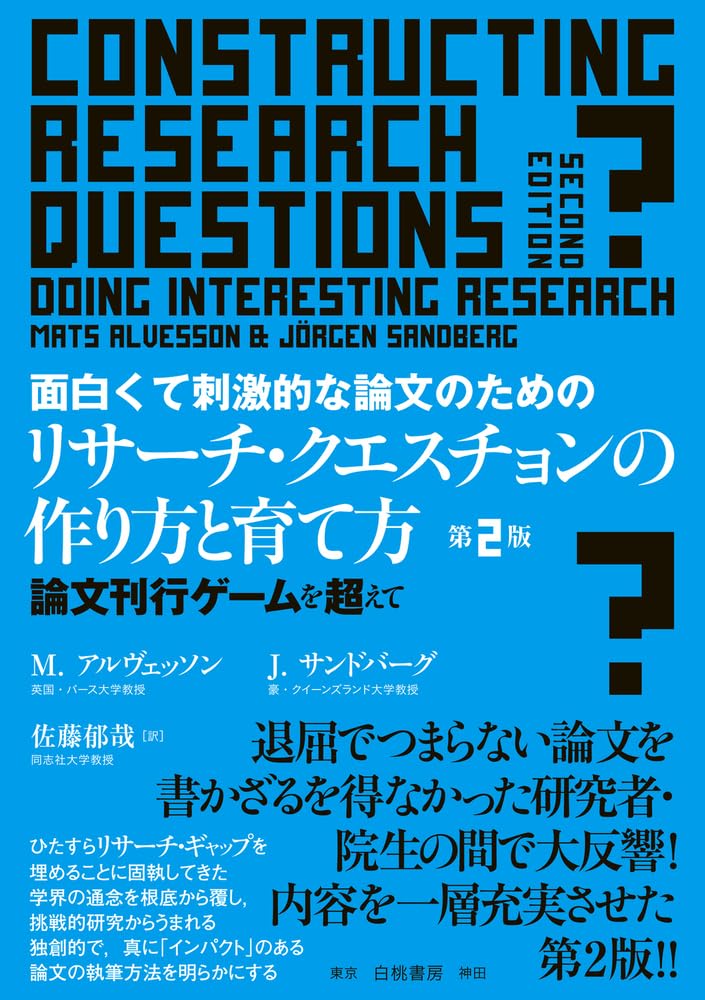
方法論的フェティシズム
Methodological fetishism
退屈でつまらない論文を生産していたと反省する研究者は「リサーチクエスチョン」を改善したらなんとかなるのではないかと妄想する
☆ 方法論的フェティシズムとは、研究そのものの実際の発見や結果、重要性よりも、研究の方法や理論を過度に優先する行為を指す。このアプローチは「方法論的 偶像崇拝」へとつながり、些細な問題に洗練された手法が適用され、既存の慣例を維持するために革新が阻害される。学者たちはこの用語を用いて、創造性や知 的好奇心を犠牲にして技術的熟練度や形式的な規則を重視する学術文化を批判する。
| Methodological
fetishism refers to the act of overly prioritizing the methods or
theories of research over the actual findings, results, or importance
of the research itself. This approach can lead to a "methodological
idolatry," where sophisticated methods are applied to trivial problems,
and innovation is stifled in favor of maintaining existing conventions.
Scholars use the term to critique an academic culture that emphasizes
technical prowess and formal rules at the expense of creativity and
intellectual curiosity. |
方法論的フェティシズムとは、研究そのものの実際の発見や結果、重要性 よりも、研究の方法や理論を過度に優先する行為を指す。このアプローチは「方法論的偶像崇拝」へとつながり、些細な問題に洗練された手法が適用され、既存 の慣例を維持するために革新が阻害される。学者たちはこの用語を用いて、創造性や知的好奇心を犠牲にして技術的熟練度や形式的な規則を重視する学術文化を 批判する。 |
| Key Aspects of Methodological Fetishism: | 方法論的フェティシズムの主要な側面: |
| Method over Content: The primary focus shifts from discovering new knowledge or addressing important societal issues to showcasing the most recent or complex research methods. |
方法論が内容に優先する: 主な焦点は、新たな知識の発見や重要な社会問題への対応から、最新あるいは複雑な研究手法の披露へと移る。 |
| Stifling Innovation: A rigid adherence to established methodologies can discourage novel ideas and the integration of interdisciplinary approaches, hindering scientific progress. |
革新を阻害する: 確立された方法論への硬直的な固執は、斬新な発想や学際的アプローチの統合を妨げ、科学の進歩を阻害する。 |
| "Methodological Idolatry": This term describes a situation where a particular method, such as randomized controlled trials (RCTs), is seen as the only valid way to achieve scientific rigor, even when it's not the most appropriate tool for the problem at hand. |
方法論的偶像崇拝: この用語は、例えば無作為化比較試験(RCT)のような特定の方法が、たとえそれが問題に対して最も適切な手段でなくとも、科学的厳密性を達成する唯一の 有効な方法と見なされる状況を指す。 |
| Gatekeeping and Dogma: It can lead to scholarly gatekeepers insisting on methodological sophistication, which reinforces conventional thinking and blocks the acceptance of heterodox ideas. |
ゲートキーピングとドグマ: これは学問的ゲートキーパーが方法論的な洗練を強要する結果を招き、従来の考え方を強化し、異端的な考えの受け入れを阻害する。 |
| Focus on Technical vs. Creative
Qualities: This perspective emphasizes a researcher's technical skill over their creative thinking, imagination, or ability to pose interesting questions. |
技術的資質と創造的資質の重視: この視点は、研究者の創造的思考や想像力、あるいは興味深い問いを立てる能力よりも、技術的スキルを重視するものである。 |
| Broader Applications: While often used in social sciences and economics to critique the dominance of quantitative methods, the concept can apply to any field where methodological complexity overshadows intellectual substance. |
より広範な応用: 社会科学や経済学において定量的手法の優位性を批判するために頻繁に用いられるが、この概念は方法論の複雑さが知的内容を覆い隠すあらゆる分野に適用し得 る。 |
| Origin: The phrase is associated with anthropologist Arjun Appadurai and his critique of how certain scholarly fields become overly focused on the "how" rather than the "what" of research. |
この表現は人類学者アルジュン・アッパドゥライ(アパデュライは、レイ
モンド・ファース[1983:89]に関連づけている)に関連付けられており、特定の学術分野が研究の「内容」よりも「方法」に過度に焦点を当てる傾向を
批判したものである。 |
| Why it's a problem: It can result in the production of sophisticated but ultimately trivial research. It can devalue important qualitative or interdisciplinary research that doesn't fit within a preferred methodological framework. It may lead to a narrow view of scientific progress, prioritizing adherence to a methodological dogma over intellectual exploration. |
問題点: 高度だが結局は取るに足らない研究を生み出す可能性がある。 好まれる方法論的枠組みに収まらない重要な質的研究や学際的研究の価値を損なう恐れがある。 方法論的教条への順守を知的探求よりも優先させることで、科学的進歩に対する視野を狭める結果を招きかねない。 |
| Google- AI |
|
リ ンク
文 献
そ の他の情報
Copyleft,
CC, Mitzub'ixi Quq Chi'j, 1996-2099
Copyleft, CC, Mitzub'ixi Quq Chi'j, 1996-2099
☆
 ☆
☆